Export opportunities, production & marketing trends
Important lectures, interesting workshops, presentation of successful case studies form a rich program at the Workshops & Seminars stage.
Leading executives from F&B companies, journalists, representatives of institutional bodies meet at Hall 2, all three days of the exhibition, with both industry professionals who are visiting the exhibition and exhibitors who want to be informed about key issues facing the F&B industry.
Technical education and human resources dominated the speeches
The third and last day of the Workshop & Seminars Stage provided interesting speeches and panels. First session, of SEVT was about “The value of human resources for the Greek Food and Beverage Industry: needs & skills. The event opened V. Papadimitriou (General Manager, SEBT), who after pointing out the essential importance of the Greek Food Industry in the GDP, she focused on the crucial role played by the workers in the sector to remain competitive in terms of the industry.
The baton was taken by A. Syrianos (Chairman of the Board of Directors of EZA, President of the Association of Industries of Thessaly & Central Greece and Member of the Board of Directors of SEV), with his speech on “EBT&P and the investment in technical education”. Mr. Syrianos began by pointing out four key factors: The problem, the opportunity, the action, and the reaction. In fact, according to him, the problem has to do with the education system, new technologies, digital skills and also that young people do not have CSR (vocational training & education). In terms of opportunities, these are influenced by both the funding resources and the initiatives developed. It is worth noting that the training and specialization of human resources is recognized as a top priority for strengthening the competitiveness of businesses. Finally, he pointed out the structural problems of CSR, the regulatory framework, and the actions.
“Government & Business: initiatives for the benefit of employment” was the topic analyzed by K. Pisli (Director of the office of the General Secretary of Vocational Education, Training and Lifelong Learning, Ministry of Education, Religion and Sports). He defined productivity and economic growth as key factors, which are indeed among the most basic in the fight against unemployment. This was followed by reference to the employment sector implications, which are not only severe but education and training will have to be reshaped. In closing, he analyzed the Reskill and Upskill of the workforce, emphasizing that it is a new model for planning and providing professional education and training.

Vaso Papadimitriou

Afterwards, G. Papadopoulos (Director of Quality Control, Research & Development of EZA) spoke about the topic “Good practice in the brewing industry: Roadmap for technical training”. He emphasized how dynamic this field is and that it is a combination of chemistry, agriculture, food technology and microbiology. Then he talked numbers, pointing out that there are 9,000 breweries and 120,000 direct jobs in Europe. Finally, he mentioned the stages of education which include 3 years of study, 880 hours of theory, practical training, intermediate and final certification exams.
The “New era in the workplace” followed. New practices, requirements and possibilities” with speaker V. Fouska (People & Culture Director, MELISSA KIKIZAS ABEET). She started with a few words about the company and then highlighted how Gen Z will affect the new conditions and the new era in the labor market. She continued by saying that the company built its strategy on these new conditions and that this new generation is engaged in the company and will continue to remain so in the coming years. Shee then listed three key strategic pillars, which are attracting new talent, how well the company helps people grow and develop, and the environment in which the company’s people work. She did not hesitate to position herself for the Wheat and Olive Academies, stating that, among other things, they offer a training and education program to young producers in order to have all the supplies.
Then, G. Routsou (Human Resources Director, BARBA STATHIS SA) analyzed the topic “Leadership, vision and effectiveness”. After a report on the company, she pointed out two important elements of it: continuous improvement and sustainability. She analyzed the term leadership and the conditions of successful leadership, while also referring to the vision of the company and what makes a vision effective. In addition, she explained the eight key steps for a successful change, the six key stages of a steering group, common mistakes in change and the real concerns of employees. After the speeches, Mr. Syrianos coordinated a panel discussion with the other interlocutors, where through his apt questions and the detailed answers of the others, additional interesting conclusions emerged.
The second session had to do with the European project I-RESTART and more specifically with “Inclusive REskilling and upSkilling Toward competitive Agrifood and veterinary sector: European agenda Strategy”. The presentation of the I-RESTART project was made by N. Kapetanakou (SEVT Program Manager). It started by saying that it was funded by the European Union and the program type is Erasmus +. 27 partners from 11 countries participate in this project and the main objectives, among others, are the retraining and upgrading of the workforce in the agri-food and veterinary sector. She then referred to the areas of technological skills, digital technologies, sustainability, soft skills, the one health approach, business and entrepreneurship as well as soft skills. Finally, she analyzed I-RESTART in terms of target numbers and its structure, while concluding by saying that the coordinator was the University of Turin.
The curtain of the Workshops & Seminars Stage was opened by I. Bratis (Management Consultant, UNIVERSAL EDUCATION SA) and G. Fragos (Project Manager, UNIVERSAL EDUCATION SA) who fully analyzed the “Presentation of training tools”, through the use of several examples. I. Bratis first spoke about their strong presence in adult education, stressing that some key elements are accuracy, flexibility, participation, high quality in educational services, while he did not hesitate to take a position on the social impact as well. G. Fragos spoke about the presentation of educational and research activities, pointing out that the identification of skills needs is based on four pillars: databases, focus groups, research and analysis of future trends. Just before closing, he discussed some sub-topics such as: The State of Technology and the Skills Pact, Methodology Design and Stakeholder Engagement, Curriculum Design, etc.
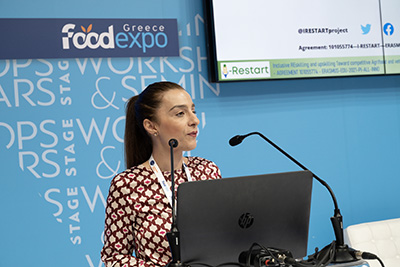
Dr. N. Kapetanakou
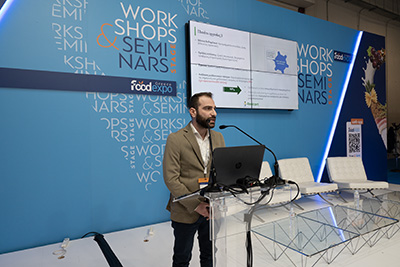
I. Bratis
Food & beverage exports as a top priority
Sunday’s Workshops started with an important open discussion on “Financial tools to strengthen the competitiveness of agricultural products”, coordinated by journalist Sissis Nika. Also present at the panel was Mr. Nikos Taboularis, head of the Agricultural Products Promotion Directorate of the Ministry of Rural Development and Food. Mr. Tavoularis referred to the exports of agricultural products and food, which in the last three years, increased by 27.36%, but also to the top 10 export products, with virgin olive oils and prepared olives holding the first two positions. He also made reference to the agricultural product promotion campaigns of the EU. with the aim of creating new opportunities in the market for the farmers of the Union and the wider food industry, while he noted that at the moment in our country 22 programs of organizations are being implemented (€42.4 million) and 6 more under contract (€11.57 million. ).
Then Mr. Miltos Stavropoulos, Director of the Panegialia Union of Agricultural Cooperatives, referred to the implementation of a strategic action plan of the Union with the aim of attracting consumers to the Asian markets and spearheading the development of new products with the contribution of the company’s R&D department, designed especially for these markets.
This was followed by the presentation of Mr. Valeris Iakovos, vice president of EAS Naxos, who thanked the people of the Ministry of Rural Development without whom the Cooperative would not be able to develop its presence outside the borders, while he also referred to the value of the agricultural products of Greece , which manage to stand out in international markets thanks to their outstanding features.
Then Mr. Giannopoulos Kostas, General Director of E.A.S.Th. SA (Agricultural Partnership of Thessaloniki) mentioned the importance of rice cultivation in the region, but also the value of promotion programs, thanks to which the Partnership managed to restore the reputation of the produced product and strengthen its presence in the Middle East.
Finally, Mr. Politis Antonis, Marketing Director of the Zagora Pelion Cooperative thanked the ministry for the support and noted the crucial role of synergies for the development of exports, so that our agricultural products can be linked with tourism and tourists can then to seek and find them in their country.
The second panel focused on “obstacles and opportunities of olive oil in the international market” and “opened” with the presentation of Mr. Vopis Nikos, Managing Director of Med-Exports, who referred to the difficulties faced by a modern olive producer who wants to export to abroad. Mr. Vopis explained that often looking to export to large European markets, we lose energy and resources that could yield much more in other markets that need Greek products and ensure us success, correct volumes and important partnerships.
Then, Mr. Douzmanis Dimitris, EXPOAID Export Manager, explained that before 2004 the world community did not even know that our country produces olive oil and that it is important to create awareness around it. He also emphasized that infrastructure, education and training are needed at all stages of production, while the people involved in promotion should also be professionals.
It was followed by Mr. Markantonakis Aris (Sales & Marketing ABEA-MYLOI KRITIS SA) who stated that the biggest problem facing exports today is the climate crisis and its effects on the quantities of products available for export and consequently and in increasing its price. He added, however, that the challenges bring opportunities and give the motivation to deal with the development of innovative products from by-products of oil production.
Finally, Ms. Skotidi Tzeni, Consultant for Export Businesses & Export Process Management, referred to the financial tools that a business can use, but also the role that knowledge of each state’s legislation, the correct labeling and the observance of the correct procedures have in exports. So knowledge, professionalism and a lot of proper work are required as exporting is an interesting journey as long as you enjoy it.

Giorgos Ekonomou, Nikolaos Vopis, Jeni Skotidis, Dimitris Douzmanis, Markantonakis Aris
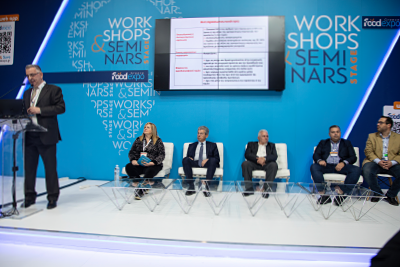
“MEAT LAB” day with meat products in focus
The second day on Sunday, moderated and presented by Mr. Oikonomou, dealt with “Meat products as a nutritional choice, inside and outside Greece”.
In the first panel on the topic “Meat-based products in the perception of the consumer”, Mr. Arsenakis Yiannis, Assistant Professor of Animal Production at GPA, was the first to be placed, who referred, among other things, to the need to increase the recognition of Greek meat, but also to how production has been affected by various factors such as the war in Ukraine, the environmental crisis, but also the large average age of farmers in our country and in the rest of Europe.
She was followed by Ms. Gogou Eleni, Assistant Professor PADA, who also participates in the first attempt to develop cell cultured meat in our country. She referred to this process but also to the needs that led to the production of the specific product which are none other than: Food security, to cover the needs of the population which is estimated to reach 10-12 billion by 2100, the reduction of the environmental footprint of animal husbandry, but also the understanding of the new needs of consumers who do not want for ethical reasons not to consume animal products.
Next was Mr. Georgopoulos Theofanis, Lecturer at the University of Thessaly, who noted that there has been pressure in the last 5 years from EU countries. to make the nutritional labeling of products mandatory, with systems such as nutriscore, which rates food with an algorithm, which has caused reactions from many member states such as Greece, as it considers it unfair. He also noted the need for proper consumer information regarding labels on meat products.
Finally, Mr. Nychas Giorgos, Emeritus Professor of Food Microbiology GPA and former president of EFET, referred to the “myth” that wants animal products and especially meat to be much more suitable for foodborne infections. As he characteristically mentioned, in the last 15 years all major nutritional crises were caused almost exclusively by plant products, without this meaning that we should avoid them. In closing, he added that the process of monitoring the safety of all food products is a demanding and difficult process.
This was followed by the second open discussion on the topic “How feasible are the Greek exports of meat preparations”, with Mr. Gerazounis Stelios, CEO Adding value – Commercial and consulting services, taking the floor first, who noted that the reasons each company makes exports differ, while he argued that there is room for Greek meat products in most markets. The point is to set the right goal, follow the right plan and be patient.
Afterwards, Mr. Kallionis Nikos, Commercial Director of KASSIDIS SA, explained the way in which the company KASSIDIS and Farma Elassonas developed their export activity. As he mentioned, they first made sure to get the necessary certifications and invested in innovative packaging, modernization of the vertically integrated unit and the slaughterhouse, in the creation of a very modern slaughterhouse, mold house and storage areas. They also listened to the company’s environmental footprint and proceeded to create a biogas plant. With all these moves, they managed to enter the international markets successfully.
Afterwards, Ms. Masoura Eleftheria, Marketing & Communication PINDOS APSI, referred to the way in which foreign companies deal with cooperatives, which they consider to be very successful models, while correspondingly they show great confidence in their product, which also helped the APSI PINDOS to design a successful strategic export plan. As he noted, exports are a marathon so it needs consistency and continuity, while he praised all of Greece’s poultry export businesses, as he typically said: “We are all pioneers in many issues, such as innovation, well-being and the circular economy.”
Finally, Ms. Panou Christina, Director of Quality Management of the Goody’s | everest catering group, referred to the criteria by which the chain’s products are selected in the international markets. As he noted, in order to succeed in exporting, a company needs to first be established in the country in which it initially operates. Then it needs to have satisfactory rates of sustainability, sufficient financial resources and human resources, appropriate specifications and supply chain: “Exporting is a difficult undertaking and needs a very strong team with a multicultural culture to be able to establish and succeed”, added Ms. Panos.

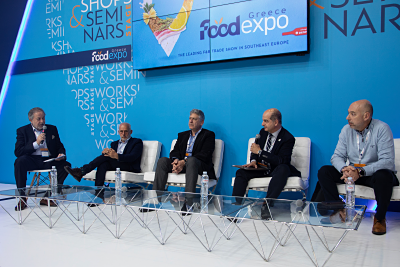
Extroversion and Innovation at the center of attention
The curtain of the Workshops & Seminars Stage on the first day of the FOOD EXPO exhibition opened with the Workshop of the Greek Exporters Association (SEVE), on the theme: Extroversion & Innovation in the development of a sustainable and competitive agro-food sector – The role of clusters, under the coordination of Mr. Nektarios Notis, Founder-CEO, Notice Content and Services.
The event was welcomed by Mr. Symeon Diamantidis, President of SEVE and Mrs. Maira Myrogianni, General Secretary of International Economic Relations and Outreach of the Ministry of Foreign Affairs. Then, Mr. Panagiotis Hassapis, Executive Vice President of SEVE, presented the export performance of the food and beverage sector, with remarkable data on the dynamics of Greek food and beverage exports.
In the open discussion, Mr. Dimitrios Papagiannidis Secretary General of Union Resources & Infrastructure, Ministry of Rural Development & Food, Konstantinos Konstantinidis, President of ATE Cluster (Agro-Technological Export Partnership), Panagiotis Ketikidis, President of Alexandria Innovation Zone and Panagiotis Menexopoulos, President & CEO of the company “Dryfo Athens – Menexopoulos Bros SA” and member of ATE. The interesting discussion discussed the value of investing in innovation and new technologies in the agri-food sector, the importance of strengthening the primary and secondary sectors and their contribution to GDP growth, as well as the need for synergies between agencies.
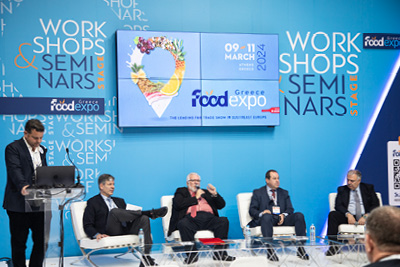
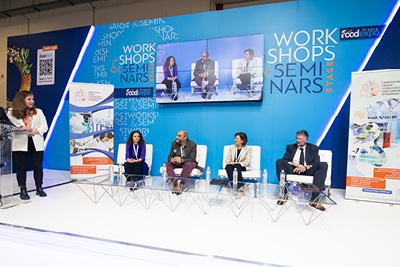
Outsourcing in the agri-food sector refers to pursuing export opportunities and approaching new markets. This can be achieved through exporting products to international markets, participating in international exhibitions and events and creating international partnerships and networks for the transfer of technology and knowledge. On the other hand, innovation in the agri-food sector encourages the development of new products and services that can respond to market needs both within and across borders, using new technologies such as genetic modification, artificial intelligence, and automation. These innovative approaches can improve productivity, reduce losses, and enhance sustainable management of natural resources.
The Agro-Technological Export Partnership, an initiative of the Greek Exporters Association (SEVE), is an innovative cooperation scheme made up of a set of interdependent entities linked together in a common field of activity. Its mission is to provide partners and members with competitive advantages of international scope by providing innovative solutions, know-how, products, and services of high added value.
Immediately after, a discussion on Exports & Customs Facilitation followed, which opened with the greeting of the Director General of AADE, Mr. Giorgos Pitsilis, who emphasized that by improving relations between the customs authorities and export companies, it facilitates the export of Greek products.
The executives of the General Directorate of Customs & Taxation of AADE participated as presenters in the discussion, and more specifically, Mrs. Konstantinos Mourtidis, Director General of Customs and VAT, Aikaterini Myrisidou, Head of the Directorate of Customs Issues, Special Regimes and Exemptions, Magdaleni Benaki, Head of the Directorate of Customs Procedures and Dionysis Zorbanos, Head of the Import-Export VAT Department of the Directorate of VAT.
Aiming to make the customs part easier for everyone, all new digital means to facilitate exporters and the approved exporter license were introduced inviting businesses to be informed both through the service and digitally about this initiative.
The conference of the Panhellenic Union of Food Technologists followed next, on the topic: “Challenges and perspectives of the food sector – Priority in safety and sustainable development”, with the General Secretary of the Union, Panagiotis Maniateas, as presenter.
The Workshop begun with the greeting of the president Ioannis Smarnakis, with the first discussion panel, titled “Reducing food waste, in view of European developments”, coordinated by Ms. Nasia Antoniou, Special Secretary of PETET. First up was Ms. Dia Horafa, Coordinator of the Alliance for the Reduction of Food Waste – who said, among other things, “Food waste is an issue of concern at the European level as from 2018 all member states are required to take measures to limit waste. In 2021, Greece also acquired national legislation with measures aimed at prevention, adopting the so-called electronic waste register, which several businesses are now obliged to update.”
Afterwards, Dr. Konstantinos Stathopoulos, Food Technologist, University Professor referred to the role of university research, noting that in the last 20 years there has been extensive activity: “Through the universities, we try to offer alternatives to the industry in order to utilize what we can from production waste. In this way we reduce the environmental footprint, but also offer a financial incentive to companies by producing additional products that generate profits.”
Then Ms. Vaso Papadimitriou, General Director of SEBT referred to the benefits of reducing food waste as well as the benefits of the parties involved. “It is a modern challenge for us to reduce waste, which concerns the entire food chain from primary production to the final consumer. Industry has an essential role to play in this effort, a role it achieves by taking action to help its members improve their environmental performance.”
Finally, Mr. Charalambos Angeloudis, Director of Certification of Management Systems & Products at TÜV AUSTRIA Hellas stated: “We, in cooperation with the Alliance and Boroume, are trying to help in the awareness of what is waste and how to achieve it. Regarding the second part, we created a certification to help businesses achieve this. Through our scheme “No food waste” we come to see how a business can set goals which it will achieve.
The Deputy Minister of Labor & Social Security, Vassilis Spanakis, delivered a welcome speech, extolling the work and role of PETET, as well as the dynamics of mass catering and the wider Greek food and beverage sector.

Lila Karapostoli, Mr. Plaketas, Yannis Kakos, Anastasios Ginidis, Panos Moraitis

Konstantinos Mourtidis, Ekaterini Myrisidou, Magdaleni Benaki, Dionysis Zorbanos
The first to speak was Mr. Panos Moraitis, who with his institutional role, emphasized the importance of the safety of the machines used in catering establishments. “The aim is to eliminate the danger caused by the misuse of machines, so as an Association we wish to take a step further in our cooperation with catering professionals.” He also spoke about the proper maintenance of the machines which contributes to safety, as well as the importance of training the catering company’s staff.
He also mentioned the SEEME Academy, which will bring many benefits to both professionals and members of SEEME, who sell equipment. The floor was taken by Mr. Anastasios Ginidis, who detailed the measures he takes as a manufacturer to ensure the safety and hygiene of food and explained that he invites customers to his factory, so that through demonstrations they can understand even better the correct operation of the equipment.
Afterwards, Mr. Yiannis Kakos spoke about the double pillar: the safety of the machine operator and the safety of food during handling, while he also referred to the relevant legislative framework that has existed for twenty years.
Mr. Plaketas emphasized that safety is institutionalized, and it would be good to have a training manual for the users of the machines and some kind of certification that they have been trained in the handling of production equipment.
Mrs. Argyro Koutsouradi, referred to the path she followed, so that from a small production unit she is now able to export. She focused on innovation, standardization/good packaging and quality as prerequisites for success.
Immediately after, Kostas Papazoglou pointed out the necessity of access to information, regarding his own experience in agricultural business.
Then Dr. Panagiotis Skandamis focused on the distance between agricultural practice and the availability of knowledge that comes from academia. In fact, while digital technology is fully applied in manufacturing, the primary sector is having difficulty finding targeted information, at a time when the term “precision agriculture” is increasingly being heard worldwide.
Dr. Andreas Souliotis and the necessity of proper guidance to avoid fines, achieve excellent product quality and preserve the good reputation of businesses. Nikolaos Gionis closed the discussion by pointing out the need to bridge the gap with synergies between producers, food businesses and mass catering with food scientists to ensure food quality and safety.

